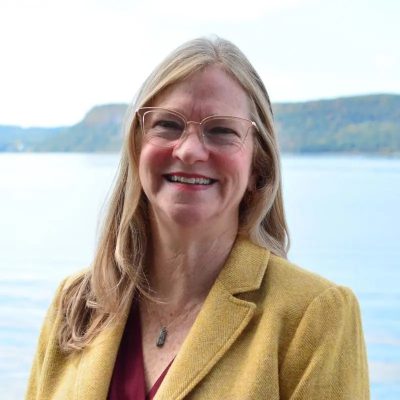Riverkeeper Sounds Alarm on Environmental Rollbacks
News Based on facts, either observed and verified directly by the reporter, or reported and verified from knowledgeable sources.

Riverkeeper, a leading environmental advocacy group, is sounding the alarm over the Trump administration’s recent efforts to roll back environmental protections, warning that the changes could threaten water quality and public health in the region.
Since taking the oath of office on Jan. 20, Trump has already made many changes to the way the U.S. handles climate change. In the past he’s called it a “hoax” – and critics say Trump 2.0 hasn’t been any more friendly to the environment than his first administration.
Tracy Brown, President and Hudson Riverkeeper, was asked about the ramifications of the barrage of moves to gut environmental rules and regulations by the new White House.
“The quality of our drinking water is very much under threat,” Brown replied.
More than 100,000 people in the Mid-Hudson Valley get their drinking water from the Hudson River.
Another leading environmental group, the Sierra Club, is also extremely concerned.
“He (President Trump) announced immediate moves to reverse policies and pacts to curb heat-trapping greenhouse gas emissions while boosting fossil fuel extraction,” the organization stated. “These actions come amid increasingly dire warnings from scientists that the world’s largest industrial economies must swiftly phase out coal, oil, and gas, the burning of which is the primary source of human-caused climate change, to avoid irreversible climate catastrophe.”
‘It Makes No Economic Sense’
Brown says Trump’s moves are bad for both public health and business.
“It gives the economic advantage to other countries while we go backwards into technologies that other countries aren’t interested in,” she said. “It makes no economic sense.”
During the same interview, she emphasized how environmental initiatives “finally had some good momentum thanks to the actions of the Biden Administration.”
But, she added, the current president “is actually blocking common sense progress and investments in the renewable sector.”
“They don’t make sense,” she stressed, “and they are not good for the economy or the people.”
Trump is also working to withdraw the U.S. from the Paris Agreement – a global accord that aims to battle climate change by getting countries to limit emissions and pollution. A total of 197 countries across the globe have signed on to that accord.
If the U.S. pulls out, it will join Iran, Libya and Yemen as the nations that aren’t participating. Brown calls this “a big deal” and “tragic.”
Protecting Against ‘Forever Chemicals’
Since 1966, when it was founded as the Hudson River Fishermen’s Association, Riverkeeper has been just that – keeper of the river. Its mission: to “protect and restore the Hudson, and safeguard drinking water supplies…and address the impact of climate change on our waterways.”
Now that mission is becoming even more challenging.
The president is rolling back Biden Administration limits on so-called “forever chemicals” getting into our drinking water.
Polyfluoroalkyl substances (PFAS) are “widely used, long lasting chemicals, components of which break down very slowly over time… Scientific studies have shown that exposure to some PFAS in the environment may be linked to harmful health effects in humans and animals,” according to the Environmental Protection Agency.
“They were detected in local drinking water supplies,” Brown said. “We are working on a state PFAS right to know law which would require more comprehensive study. We still don’t understand how much is out there, more study is needed.”
But when asked about the new EPA administrator, former New York Congressman Lee Zeldin, Brown expressed a hint of optimism.
“Since he’s from Long Island he’s someone who sees the impacts of climate change and he’s been a supporter of cleaning up the Sound,” she said. “We will see. We don’t want to prejudge at this point. I think he cares about clean air and clean water but how is he really going to protect it by following the other directives of President Trump?”
She added that the organization remains “most concerned about waterways near airports as PFAS are in firefighting foam amongst other things.”
Both Stewart and White Plains airports are right in our backyard.
Rough Seas at NOAA
It’s been anything but smooth sailing at the National Oceanic and Atmospheric Administration, or NOAA.
The agency’s mission is “to understand and predict changes in climate, weather, ocean, and coasts, to share that knowledge and information with others, and to conserve and manage coastal and marine ecosystems and resources.”
A pair of California Democrats who have been leading the charge on environmental issues are Reps. Jared Huffman and Zoe Lofgren.
They issued a scathing statement about Elon Musk’s Department of Government Efficiency, known as DOGE.
“They have now reached NOAA where they’re wreaking havoc on the scientific and regulatory systems that protect American families’ safety and jobs,” they said.
Brown also weighed in.
“NOAA is very important and productive and greatly benefits the Hudson,” she remarked. “It provides huge value including lifesaving storm forecasts for us. It’s very concerning that it’s become one of the targets for DOGE efforts.”
Money Matters
The administration’s move to freeze federal funding and grants is also impacting nonprofits like Riverkeeper.
Even though its future remains uncertain as the White House fights a court battle to implement it, that very uncertainty is troubling to those groups.
“A lot of the state dollars are local distribution of federal dollars,” Brown said. “We’re concerned that this will also impact the state grants…like the state clean water revolving fund. It’s having a huge ripple effect.”
Riverkeeper Keeping Its Promise
In the face of all of this, Riverkeeper is trying to stay the course with its core mission and values.
“We will have to double down on our science and make sure it’s responsive to the needs of the community,” Brown said.
She also noted how the group is “working closely with the state to have it replicate as best we can the federal rollbacks.”
“We are also doing more work with partners nationally like the National Resources Defense Council (NRDC) and the Waterkeeper alliance, looking to find common cause,” Brown added.
What Can You Do?
Brown wanted to be sure people still felt empowered to help.
“Please encourage people to support their local nonprofit as we are very much at risk from these reductions in federal funding and budget cuts, so we need members of the public to step into the breach,” she said. “It’s going to hit nonprofits hard.”
But she warns the government’s scope and power are broad.
“Groups like Riverkeeper can fill some gaps, but none of us will be big enough to make up for the restoration and enforcement that we benefit from,” she concluded.

Larry Epstein, a two-time Emmy Award-winning documentary and news producer, is an experienced broadcast and print journalist, writer, and anchor.
